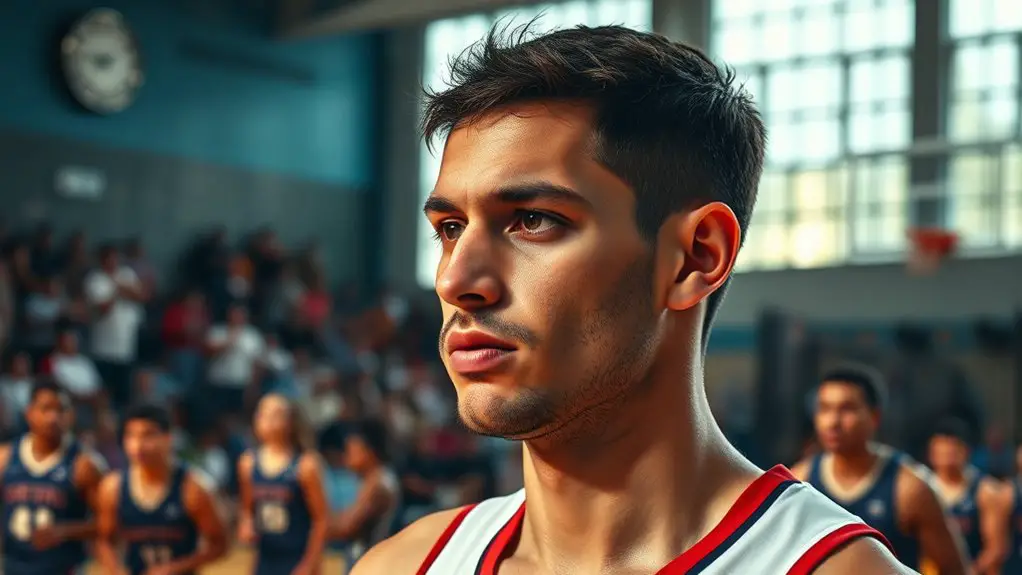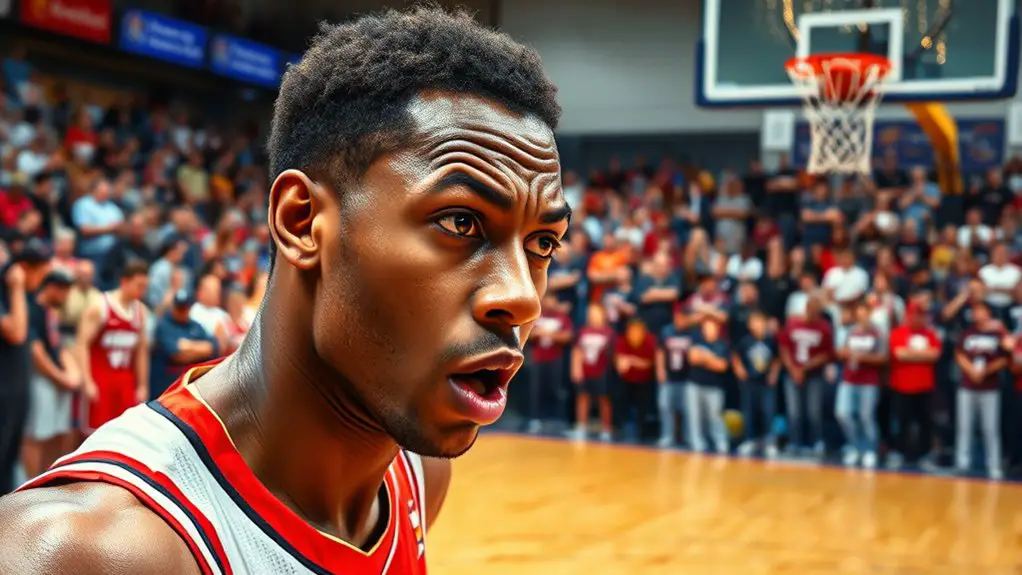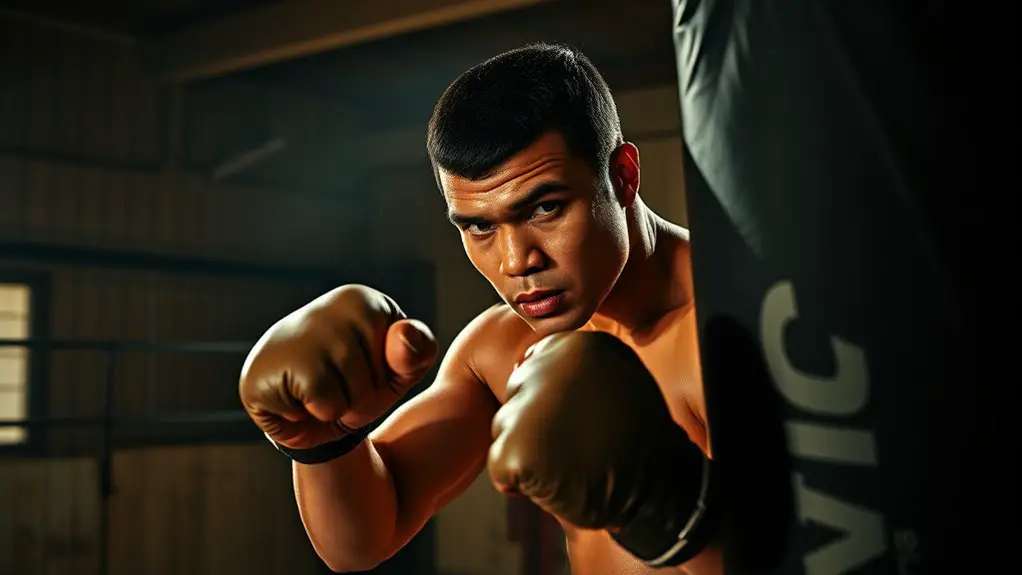Mindfulness greatly enhances your game-time focus. It helps you stay present, reduces distractions, and improves your performance under pressure. By practicing techniques like mindful breathing and visualization, you gain control over your thoughts and emotions, leading to better decision-making during vital moments. As you develop mental resilience, you'll find it easier to filter out distractions and maintain concentration. Discover how you can incorporate mindfulness into your training regimen for even greater benefits.
Understanding Mindfulness in Sports
Mindfulness in sports is all about being fully present and engaged in the moment, which can greatly enhance your performance. By practicing mindful breathing, you can ground yourself, focus your thoughts, and tune out distractions. This process helps create a sense of freedom, allowing you to let go of performance anxiety and embrace the joy of the game.
When you develop mental resilience, you're better equipped to handle challenges and setbacks during competition. Instead of getting overwhelmed, you can maintain clarity and composure, leading to improved decision-making and execution. Mindfulness enhances focus and reduces anxiety, enabling athletes to perform at their peak even under pressure.
Incorporating mindfulness into your training can transform your approach to sports. You'll find that the more you practice being in the moment, the more natural it becomes. This shift not only elevates your performance but also enriches your overall experience, allowing you to play with passion and purpose. Embrace mindfulness, and release your true potential on the field.
The Science Behind Mindfulness and Focus
When you practice mindfulness, you're not just calming your mind; you're also changing how your brain functions. Research shows that it can reduce stress and improve your concentration abilities, making a noticeable impact during high-pressure moments. Let's explore how these science-backed benefits can enhance your game-time focus. Additionally, mindfulness practices can help athletes develop mental toughness, enabling them to thrive in high-pressure situations.
Brain Activity Changes
As you engage in mindfulness practices, your brain undergoes notable changes that enhance focus and attention. These shifts aren't just subtle; they transform your brain wave patterns and promote neural synchronization, allowing you to tap into a state of heightened awareness.
- Improved concentration on tasks
- Enhanced reaction times during gameplay
- Greater clarity in decision-making
- Increased creativity and problem-solving skills
Stress Reduction Techniques
One of the most powerful benefits of mindfulness is its ability to reduce stress, which greatly impacts your focus and performance. When you're feeling overwhelmed, integrating breathing exercises into your routine can ground you. Just a few deep breaths can center your mind, making it easier to tackle challenges head-on. Visualization techniques also play a key role in stress reduction. Picture yourself succeeding in your game, feeling the excitement and confidence build within you. This mental imagery can shift your perspective, transforming anxiety into motivation. By embracing these practices, you'll not only alleviate stress but also liberate your mind, allowing your natural talent to shine during critical moments. Experience this freedom and see how it elevates your performance.
Enhanced Concentration Abilities
While many people associate mindfulness with relaxation, its true power lies in enhancing concentration abilities. By integrating mindfulness into your routine, you can access focus techniques that sharpen your mental clarity. This isn't just about zoning out; it's about tuning in to the present moment and engaging fully with your tasks.
Here are some effective concentration exercises you can try:
- Breathing Awareness: Focus on your breath to center your thoughts.
- Body Scan: Tune into physical sensations to ground yourself.
- Mindful Observation: Engage your senses by observing your surroundings.
- Single-Tasking: Commit to one task at a time, minimizing distractions.
These practices can liberate your mind, enabling you to perform at your peak during pivotal moments.
Benefits of Mindfulness for Athletes
When you practice mindfulness, you can sharpen your concentration skills, making it easier to stay focused during vital moments in a game. It also helps reduce stress, allowing you to perform better under pressure. Exploring these benefits can transform your athletic performance and mental resilience. Additionally, mindfulness enhances mental conditioning for athletes, providing them with the tools to excel in high-stakes situations.
Enhanced Concentration Skills
Mindfulness training can considerably enhance your concentration skills, allowing you to stay focused during high-pressure moments in competition. By incorporating effective focus strategies and concentration exercises into your routine, you'll find it easier to maintain clarity and precision in your performance.
- Heightened awareness of your surroundings
- Improved ability to filter distractions
- Enhanced mental resilience during challenges
- Greater control over your thoughts and emotions
These benefits empower you to break free from mental clutter, giving you the freedom to fully engage in the moment. As you cultivate these skills, you'll notice a significant boost in your game-time focus, enabling you to perform at your best when it truly matters. Embrace mindfulness, and watch your concentration soar!
Stress Reduction Techniques
Stress can be a significant barrier to peak performance for athletes, but mindfulness offers effective techniques to manage it. By incorporating breathing exercises into your routine, you can cultivate a sense of calm that allows you to focus better during competition. Just a few deep breaths can help ground you, reducing anxiety and enhancing clarity.
Additionally, visualization techniques can empower you to see success before it happens. Imagine yourself executing your skills flawlessly; this mental rehearsal can build confidence and ease tension.
Embracing these mindfulness strategies not only helps you tackle stress but also fosters a liberating sense of control over your performance. So, take a moment to breathe and visualize, and you'll find yourself more focused and ready to excel.
Techniques for Practicing Mindfulness
Although you might feel overwhelmed by distractions during a game, practicing mindfulness can help sharpen your focus. Here are some effective techniques to get you started:
- Breathing exercises: Take a moment to inhale deeply and exhale slowly. This calms your mind and centers your attention.
- Visualization techniques: Picture yourself performing at your best. Visualizing success can boost your confidence and focus.
- Body scan: Bring awareness to each part of your body, releasing tension and grounding yourself in the moment.
- Mindful listening: Focus on the sounds around you, whether it's the crowd or the rhythm of your breath. This enhances your awareness and keeps you present.
Incorporating these techniques into your routine not only improves your game-time focus but also grants you a sense of freedom from distractions. Embrace mindfulness, and watch your performance soar.
Mindfulness and Stress Management
When you find yourself overwhelmed by the pressures of competition, integrating mindfulness into your routine can be a game-changer for managing stress. By focusing on the present moment, you can free yourself from the weight of future expectations and past mistakes. This shift not only enhances your emotional regulation but also promotes a sense of calm in high-pressure situations.
Mindfulness techniques, like deep breathing or body scans, help you tune into your feelings without judgment. This awareness allows you to identify stress triggers and respond more effectively, rather than reacting impulsively. As you practice mindfulness regularly, you'll notice a growing ability to maintain your cool, regardless of what's at stake. Additionally, mindfulness practices help focus on the present moment, which is crucial for optimal performance under pressure.
Embracing mindfulness isn't just about reducing stress; it's about reclaiming your freedom and enjoying the game. So, take a deep breath, center yourself, and let mindfulness guide you through the challenges ahead.
Enhancing Performance Through Concentration
To enhance your performance, concentrating fully on the task at hand is essential, as it allows you to tap into your skills and instincts. By honing your focus, you can elevate your game to new heights. Here are some effective focus techniques to reflect upon:
Concentrating fully on your task unlocks your skills, allowing you to elevate your game and embrace your instincts.
- Breathe deeply: Ground yourself with each breath to clear distractions.
- Set clear intentions: Define what you aim to achieve in each moment.
- Visualize success: Picture yourself executing your moves flawlessly.
- Limit distractions: Create an environment that supports your focus.
These performance enhancement strategies empower you to embrace your freedom on the field. By implementing these techniques, you'll find that not only does your concentration improve, but your overall performance flourishes. Remember, it's about connecting with your instincts and letting your skills shine through. Focus, and watch your game transform! Additionally, incorporating visualization techniques can significantly bolster your mental preparation and readiness for competition.
Real-life Examples of Mindfulness in Action
Mindfulness isn't just a concept; it's a practice that athletes integrate into their routines with remarkable results. You might be surprised to see how top performers use techniques like mindful breathing and focused visualization to enhance their game-time focus. Here are some real-life examples:
| Athlete | Mindfulness Technique | Result |
|---|---|---|
| Kobe Bryant | Focused visualization | Improved shooting accuracy |
| Serena Williams | Mindful breathing | Enhanced calm under pressure |
| Tom Brady | Visualization of successful plays | Greater game awareness |
| Michael Phelps | Mindful breathing before races | Reduced anxiety |
| LeBron James | Visualization of key plays | Better decision-making |
These athletes show that mindfulness isn't just for relaxation; it's a powerful tool for achieving peak performance. Additionally, incorporating intrinsic motivation into their routines further enhances their ability to stay focused and committed during critical moments. As you explore these examples, consider how you might adopt similar practices to release your own potential.
Implementing Mindfulness Into Training Regimens
As athletes endeavor to reach their peak potential, incorporating mindfulness into training regimens can significantly enhance their performance. By embracing mindfulness exercises, you can sharpen your focus and cultivate a sense of awareness that translates to game-time excellence. Here are some ways to integrate mindfulness into your training:
- Breathe deeply: Start each session with focused breathing to center your mind.
- Visualize success: Spend time imagining your goals and the steps to achieve them.
- Practice body scans: Tune into physical sensations to recognize tension and release it.
- Engage in mindful movement: Whether it's running or lifting, stay present with every movement.
Training integration of mindfulness not only bolsters your performance but also fosters a sense of freedom, allowing you to play with authenticity and confidence. Embrace these practices, and watch how your focus sharpens when it matters most. Additionally, adopting a growth mindset can further enhance your ability to stay present and resilient during high-pressure moments.
Frequently Asked Questions
Can Mindfulness Improve Decision-Making During Games?
Mindfulness can definitely improve your decision-making during games. By using focus techniques, you can enhance your mental clarity, allowing you to make quicker and more accurate choices. When you're fully present, distractions fade away, and your intuition becomes sharper. This newfound awareness lets you read the game better and respond effectively to opponents. So, if you're looking for that edge, incorporating mindfulness into your routine could be the key to revealing your full potential.
How Long Does It Take to See Results From Mindfulness?
When you start practicing mindfulness, you might notice short-term benefits pretty quickly, often within a few sessions. You'll feel calmer and more centered, which can enhance your focus. However, the long-term effects take time to develop. Consistent practice over weeks or months deepens your awareness and decision-making skills. So, while immediate improvements are possible, embracing mindfulness for the long haul brings the most significant changes, granting you the freedom to perform at your best.
Is Mindfulness Suitable for All Sports?
You might wonder if mindfulness suits all sports. The great news is its benefits can enhance performance across sports diversity! Whether you're into individual sports like running or team sports like soccer, mindfulness can help you stay focused and calm under pressure. It's all about finding what works best for you. Embracing mindfulness can give you the freedom to enjoy your sport while improving your mental game, no matter the discipline you choose.
Can Mindfulness Help With Post-Game Recovery?
When it comes to post-game recovery, practicing mindfulness techniques can really be a game-changer. You'll find that taking a moment to center yourself helps reduce stress and lowers muscle tension. The recovery benefits are significant; it allows you to process the game, reflect on your performance, and recharge mentally. So, don't underestimate the power of a calm mind—it's like striking gold for your overall well-being and future performance.
What Age Should Athletes Start Practicing Mindfulness?
When it comes to youth athletes, starting mindfulness practice early can be incredibly beneficial. You don't need to wait until they're teens; introducing mindfulness concepts around age 8 or 9 can set a strong foundation. These practices can help them manage stress, improve focus, and foster a positive mindset. By allowing young athletes to explore mindfulness, you're giving them tools that can enhance their performance and overall well-being throughout their athletic journey.



